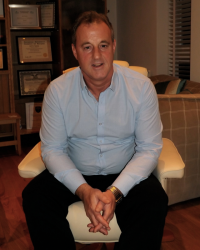Menopausal misery alleviated with hypnotherapy
Are you one of the lucky ones? Are you one of the small percentage of women who breeze through the menopause without any symptoms? Statistics would suggest that if you said yes, you are one of a small minority of women for whom this is the case. The vast majority of women experience symptoms that disrupt their lives to a greater or lesser extent at this time in their lives.
The age at which the menopause kicks in, generally preceded by the perimenopause, is a very individual thing. For most women it will be between the ages of 45 and 55, with average age being 51, however this can vary greatly in some cases due to a variety of factors. Genetics can pay a part – if there is a family history of early or late menopause, there is a chance that this will influence the time at which your menopause begins; smoking can accelerate its onset and if you have had chemotherapy or surgery to remove ovaries this may also impact. One thing that is certain, the menopause affects every woman.
From speaking to clients, I know that the severity of symptoms varies greatly from woman to woman, with some just having easy to live with, occasional hot flushes. At the other end of the spectrum however, are women for whom life is a continual round of hot flushes and night sweats, coupled with being tired all the time, cognitive issues such as poor concentration and memory, mood swings, weight gain and feelings of despair. This can come at time when women are already coming to terms with the effects of aging, dealing with elderly parents who need extra support, grown up children with their own set of issues, and sadly, relationship breakdown, which is all too common in this age group. Women can feel overwhelmed with the situation they find themselves in.
Once a taboo subject, menopause is now being talked about much more openly, as women become more vocal about their health concerns. What is clear though, is that the treatments available to alleviate the symptoms of the menopause are not cut and dried. Of course, traditional Hormone Replacement Therapy (HRT) can be a solution for some, however there is a significant group of women, due to their own or familial health issues, for whom this is not suitable. There is also a large group of women who do not want to go down this route, believing that the risks outweigh the benefits.
Clients have told me about their endless round of trying ‘alternative’ therapies such as herbal remedies (black cohosh, red clover, evening primrose oil) with zero or minimal effect, taking yoga sessions, visiting chiropractors, acupuncture, the list is endless and none of these approaches appear to have any significant beneficial effect. However, a recent study by the North American Menopause Society (NAMS) into the effectiveness of non-hormonal treatments for menopause symptoms, has identified clinical hypnotherapy as being one of the few effective methods to successfully treat the condition.
The statistics are impressive. 187 postmenopausal women, who reported suffering from at least 50 hot flushes a week, evaluated clinical hypnosis over 12 weeks, against a control group who were given 'active structured attention control', essentially talking therapy. All the women attended a 45-minute session once a week for five weeks during the trial. Those in the hypnotherapy group were given at-home self-hypnosis practice to undertake, while the control group was given a recording to listen to that had simply information about hot flushes.
The study identified:
- A significantly lower incidence of hot flush frequency in the group who had hypnotherapy, with a 74% reduction compared to 17% in the control group. The frequency and severity scores for hot flushes of those who had hypnotherapy were reduced by 80% versus 10% in the control group.
- Skin sensors showed a 57% reduction in hot flushes among the hypnosis group, compared to a 10% reduction in the non-hypnosis group.
- The women treated with hypnosis were far less likely to report that the hot flushes interfered with their daily lives and sleep.
These statistics do not surprise me. For many years, hypnosis has been misunderstood and underestimated, but research is starting to show what I and other therapists have known for a long time - that our sub-conscious mind holds the key to our behaviours, feelings and functions. In the case of menopause, hypnotherapy can help women identify and deal with the whole spectrum of factors that are contributing to their symptoms. It is a transitional time and as such can cause anxiety on many levels.
In my experience of treating many women experiencing menopause related problems, hypnotherapy can effectively address the underlying issues, improve general well being and self confidence and help women view this as a positive transition.
Hypnotherapy sessions are a very pleasant and relaxing experience, in which your body and mind are peaceful and relaxed. Your first session will involve taking a detailed history, identifying and discussing the main problems you are experiencing and devising an individual treatment plan. This session will generally last around an hour and a half. Subsequent sessions will last about an hour and the recommendation will generally be for four to six sessions.
We are all capable of so much more than we often realise and it is incredibly rewarding helping clients to realise their ambitions and desires for life. If you would like to explore the options in more detail, please get in touch, I will be happy to help.

Find the right hypnotherapist for you
All therapists are verified professionals
